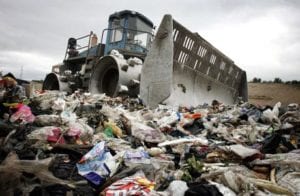by Yanna Erasmus
The United Nations Environmental Programme, is calling for urgent and sustainable waste management practices across the world. As the standard of living rises, and development and urbanisation take hold, waste may well become one of our biggest challenges yet. According to UNEP: The threat posed by poor waste management is particularly prominent in low-income countries where waste collection rates are often below 50%. The 2011 Census results for South Africa indicate a similar, albeit better, trend. Around 62.1% of households in the country have an ‘at least weekly’ refuse removal system. Around 1.5% of households have a ‘less often’ removal system with 1.9% using a communal refuse dump. A staggering 28.2% used their ‘own’ refuse dump and 5.4% have no refuse removal at all. UNEP says that currently around 1.3 billion tpa of waste is generated globally and this figure is expected to climb to 2.2 billion tpa by 2025. The more affluent a society, the more waste is generated due to increased consumerism and packaging, and if projections are correct, the global middle class is expected to grow to 4.9 billion people by 2030. The world faces immense challenges in not only minimising waste but utilising and reusing it. But first, urbanisation must be brought under control. According to UNEP: Public waste systems in cities cannot keep pace with urban expansion; rapid industrialisation is happening in countries that have not yet developed the appropriate systems to deal with hazardous and special wastes and the growing trade in waste poses significant challenges. Waste management is one of the most complex and cost intensive public services, absorbing large chunks of municipal budgets even when organised and operated properly. To put this into perspective: the US is the biggest generator of waste in the world with around 250 million tpa, around 30% of the global waste burden. That equates to roughly 76 kg per person per year. The country’s Fresh Kills landfill site on Staten Island takes in 26 t daily, totalling 9.5 million tpa compared to, for example, the city of Johannesburg, which generates around 1.4 million tpa. Recycling rates in the US are not where they should be.The US Environmental Protection Agency reports that in 2010 around 34.1% of the total waste was recycled and composted. In South Africa, rates are a little higher, even though they differ per recyclable material from the US. Can recycling stands at around 69% with paper at 59%, glass at 25% and plastics around 17%.
It is not only a matter of we could do better, we have to do better. The lack of waste management impacts basic human needs including clean water and air, and safe food. Poor waste collection leads to the spread of disease and further, improper disposal of hazardous waste with municipal waste can be very harmful to workers in the sector, adjacent communities and the environment. A case in point is the almost 7 000 t of healthcare waste dumped in and around Welkom during November 2009. So hazardous was that waste that 18 000 t of material was finally removed from the site due to the contamination of the soil that came into contact with the healthcare waste. But unsound waste management also has a social dimension. Like most environmental hazards, deficiencies in waste management disproportionately affect poorer communities as waste is often dumped on land adjacent to slums. Left with the choice between going hungry and waste picking, 1% of the urban population in developing countries choose to sift through the detritus on dumps and dirty streets. South Africa is no stranger to the informal reclaimers that not only traverse the streets of the city’s suburbs on refuse removal days but also frequent landfill sites across the country in search of recyclable materials. These people are constantly exposed to hazardous substances in special waste and also to injury and infection on landfill sites. However, it is not as simple as disposing of waste safely. We simply cannot afford to throw waste away anymore. Landfill space is limited, the air space of the current landfills is limited and the cost to maintain these to the benefit of the environment or surrounding communities is exorbitant. As such, there are significant opportunities for organising the waste sector in a way that makes it economically viable and socially and environmentally sustainable. UNEP says: If handled properly, waste management has the potential to turn problems into solutions and to lead the way towards sustainable development through the recovery and reuse of valuable resources. This will not only create new avenues of employment but also mitigate greenhouse gases and climate change. Innovation is required and for such an environment to flourish, government, local authorities, municipalities and the private sector must work together to create a sustainable platform in which to apply the three Rs: reduce, reuse and recycle. Isolated efforts will not benefit the country in the long run. From separation at source through to the creation and marketing of recycled waste products, whether compost or a plastic bottle, it has to be a cooperative effort.






